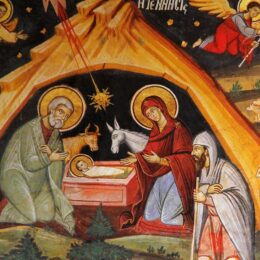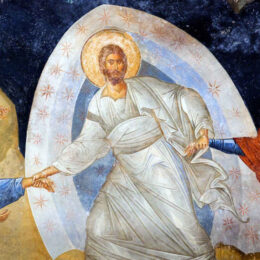BreakPoint | Stephen Reed | March 19, 2009
The idea that someone else can vicariously take responsibility for your sin and, additionally, impute their righteousness to you, runs counter to their form of reason. After all, isn’t human responsibility for our actions what makes us higher than the animals? If you have someone taking care of your sins for you, well, where’s the penalty? Moreover, where’s the credit for doing good?
[…]
Of course, Jesus never suggested that we dispense with the moral law. He saw this charge coming and answered it head on. “Do not think that I came to destroy the Law or the Prophets. I didn’t come to destroy them, but to fulfill them,” He said in Matthew 5:17.
The question is not whether the moral law is necessary or worthy of respect. Both Judaism and Christianity—and, in its own way, Islam—agree that the moral law is the bedrock of human behavior and society. No, the question is not whether to obey the moral law or not but how?
In the apostle Paul, Christianity has the most candid of writers, one who relates well to our human condition. “For we know that the law is spiritual,” he notes in Romans 7:14-15. “But I am of the flesh, sold into slavery under sin. I do not understand my own actions. For I do not do what I want, but I do the very thing I hate.”
Obviously, knowing the moral law is not enough for any of us. As a Pharisee, Paul knew the Jewish moral code quite well, but he was still capable of monstrous acts. We can know what is right until we’re blue in the face but still have the problem of the will, the desire to go our own way. The war within our hearts is beyond our moral instruction alone.
But as St. Augustine noted so well, “Our hearts are restless until they find their rest in you, O Lord.” In short, we need outside help. Help beyond ourselves. Something from “out there” to invite into our hearts, so that we may truly begin to profit and follow what we read in the Scriptures.
Judaism’s answer to this obvious need is to be grateful for a God that gives us moral guidance through the Torah. But from there, it seems to be our responsibility alone. This approach to God seems very existential. God is out there somewhere but has at least left these laws to follow. Good luck!
But Christianity maintains that a third part of the Trinity, a real and supernatural presence, is not only here on earth in the form of the Holy Spirit but can be invited inside the individual believer’s heart, mind, and consciousness, helping the believer to transform into something much better over time. Why?
The belief in a Holy Spirit who dwells within the willing believer is how Christians can speak of becoming a new creation. No longer is it just the individual doing it all. Now, they have an ever-present friend to give them strength, guidance, remonstrance, and love. Once invited in, the Holy Spirit is there to pull the individual’s ox cart of sin out of the proverbial ditch—and to help him more fully live his God-given life, perhaps discovering joy for the first time.
Whether found in some of the Pharisees in Jesus’ time or in many churches, synagogues, temples, and mosques today, the strict devotees of the moral law are not wrong about the importance of the law. But anyone who believes that he can earn God’s favor or that he can follow the law well with no help from God’s cavalry, is fooling only himself. Without inviting the presence of God to transform us from within, we will never advance to what God wants us to be. Or what we want to be, for that matter.
Many people, throughout Christendom and in other faiths, still want to enter the Kingdom of God by their very own brand of righteousness. Through a sprinkling of good deeds and works, they feel entitled to citizenship in that Kingdom. Heaven laughs.
[…]
From the beginning of our faith’s founding, Christianity has seen this and provided a simple answer: Ask Christ into your heart. Take stock—you can’t do it alone. Surely that is obvious now. So admit it and get on with it. Christianity is a candid, even brash faith, isn’t it? But better to know the truth, no matter how bracing.
Then let Christ dwell through the presence of the Holy Spirit, helping you pull your cart, now inspiring you to whistle while you work. If any man is too proud to take Jesus’ help in towing that load, that’s up to him, of course. But what a completely unnecessary load.
Christianity asserts that heaven is not a collection of the brightest and best spirits—just the redeemed who weren’t too proud to accept a gift with open hands.
. . . more



